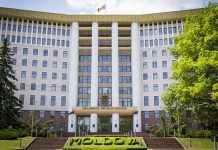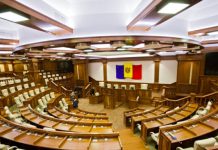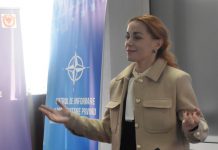The leaders of Moldova and its separatist Transdniester region have agreed to jump-start efforts to resolve their decades-long dispute through a combination of bilateral contacts and international mediation.
A Kremlin-brokered meeting in Moscow on March 18 was only the second direct contact between Moldovan President Vladimir Voronin and Transdniestrian leader Igor Smirnov in almost eight years.
The two leaders and Russian President Dmitry Medvedev issued a joint statement that also pledged eventually to place the peacekeeping force in Transdniester, which is currently under Russian command, under the auspices of the Organization for Security and Cooperation in Europe (OSCE).
While Voronin, whose Communist Party faces general elections on April 5, may have emerged a winner from the meeting in the immediate term, the talks arguably engender little in the way of new hope of resolving the frozen conflict in Transdniester.
Medvedev scored what looks like a foreign policy success by bringing together the Moldovan and Transdniestrian leaders and extracting pledges to conduct more consistent bilateral negotiations.
Voronin and Smirnov each met with Medvedev separately before gathering for three-way talks at Barvikha, near Moscow.
Kremlin Push
Analysts say Moscow, which has recently pushed for a resumption of the stalled two-way negotiations, is eager to prove it can still be an honest mediator in the post-Soviet neighborhood’s frozen conflicts after its military intervention in Georgia last August.
But Moscow’s drive toward a settlement, which included a recent visit to Chisinau by Russian Foreign Minister Sergei Lavrov, has raised eyebrows in the West, where officials worry that the Kremlin is looking to bypass the existing framework for international negotiations.
Lavrov, speaking to journalists after the March 18 talks, scrambled to reassure the international community that the so-called 5+2 format of negotiations — which includes Russia and Ukraine as guarantors, the OSCE as mediator, and the United States and the European Union as observers — remains as important as ever.
"The parties will continue direct contacts to intensify the negotiation process," Lavrov said. "The parties will intensify the work of expert groups to build confidence measures. The parties reaffirmed the importance of the 5+2 format, and agreed to create conditions for the earliest resumption of work in this format."
Pursuing An Agreement
Transdniester’s independence, which was declared in 1990 from then-Soviet Moldova, has not been recognized by any foreign governments, but Moscow has supported the territory unofficially, mainly during the armed conflict between Moldovan forces and Transdniestrian paramilitaries in the summer of 1992. Some 1,000 people were killed in the fighting, which was triggered by Transdniestrian fears that Moldova would seek reunification with neighboring Romania. The fighting was curtailed by the intervention of Russia’s 14th Army on the separatists’ side.
The separatists have since maintained a hard-line stance toward de facto independence, while Moldova has offered only wide autonomy. Russia has continued to keep troops in the region since the end of the armed conflict, and beyond a 2002 deadline mutually agreed with the OSCE 10 years ago. Some of the troops have taken on a peacekeeping role, while some 1,000 regular forces remain in Transdniester nominally to guard Soviet-era arms depots.
The joint statement provides for the peacekeeping contingent — made up mostly of Russian forces — to be turned into an international mission under the control of the OSCE. However, Lavrov said that could only happen after the two sides have come to a final agreement.
"The parties noted the stabilizing role of the current peacekeeping operation in Transdniester, and agreed that it would be expedient to transform it into a new mission under the auspices of the OSCE after a settlement is reached," Lavrov said.
Much Uncertainty
Given the absence of any progress in the largely ceremonial talks between the two sides, analysts have expressed skepticism that the OSCE is likely to take over the peacekeeping mission anytime soon.
Moldovan political commentator Vlad Lupan suggested that the statement amounts to carte blanche for Russian troops to remain in Transdniester as long as they like.
"The formula [presented in the joint declaration] implies that the departure of the Russian troops will only be possible after the conflict has been finally resolved," Lupan said. "In fact, what this is about is not the improbable transformation of the current peacekeeping mission [into an OSCE-supervised contingent], but about the lack of future progress toward a Russian withdrawal."
On the face of it, Voronin could be seen as going back to Chisinau a winner, bringing a clear endorsement from the Kremlin for his Communist Party in the upcoming elections. The Communists are seen as favorites in the April 5 poll, and although Voronin is not allowed to run again after two constitutional terms, he is largely expected to retain his control over the party.
Voronin, a former Soviet Interior Ministry general, has been seeking to promote among Moldovans a "father of the nation" image not unlike Alyaksandr Lukashenka’s in Belarus. In that respect, he may have been thrilled to hear Medvedev specifically crediting him for his role in preventing bloodshed in the region in spite of the unresolved 19-year-old conflict with Transdniester.
Voronin isn’t returning home, to Europe’s poorest country, empty-handed. Instead, he’s bringing what looks like an unexpected gift for his voter base of destitute farmers: a promise of some 50,000 tons of Russian fuel oil, to be distributed as humanitarian aid to farmers just in time for spring sowing — and the end of the election campaign.
However, Voronin may have paid a dear price for ensuring Medvedev’s support after years of frosty relations with former President Vladimir Putin.
The true extent of the deals cut by Voronin in Moscow may come to light only after the April 5 elections.
Radu Benea of RFE/RL’s Moldovan Service contributed to this report from Chisinau






